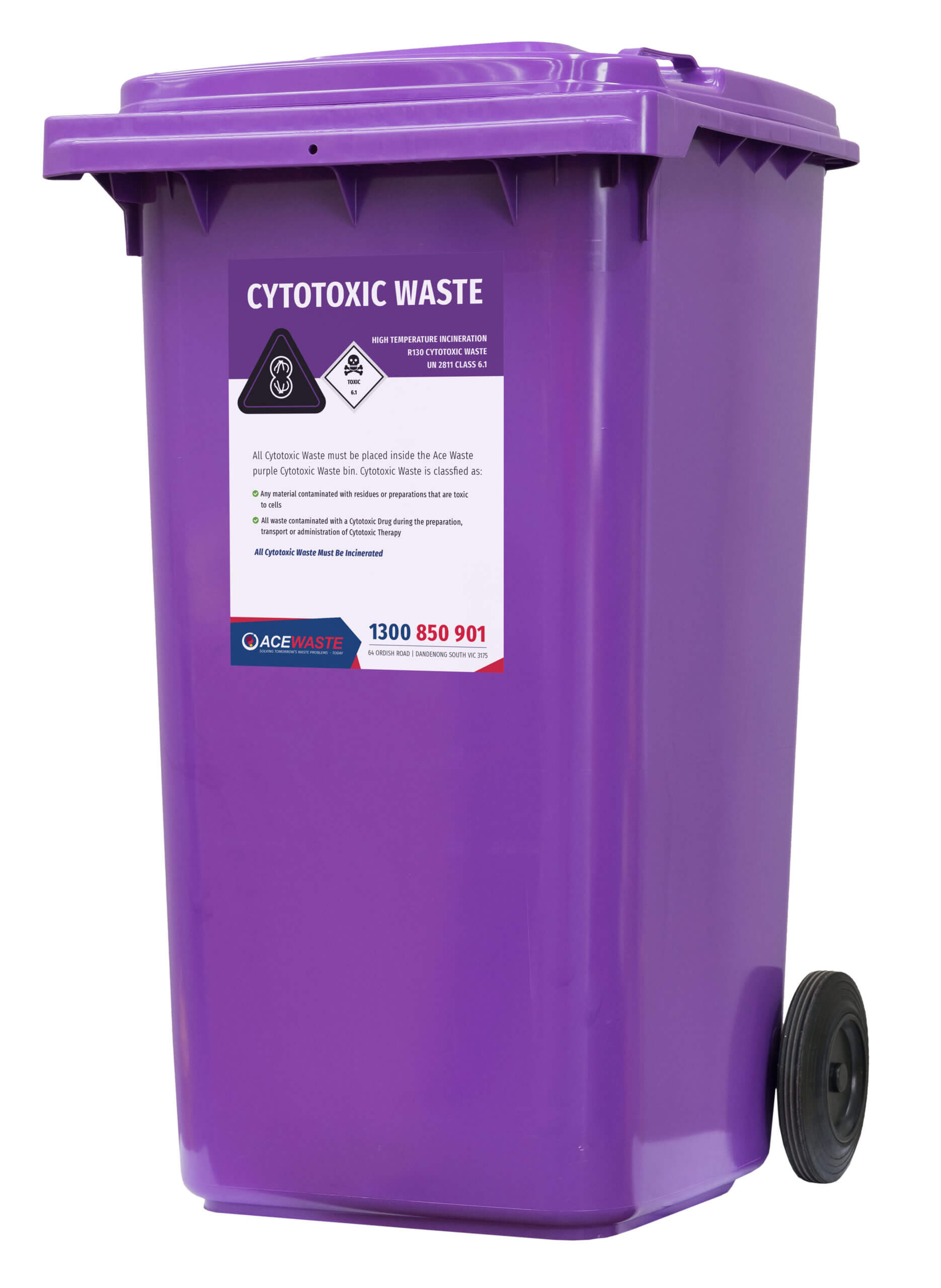
Cytotoxic Waste Disposal
Cytotoxic Waste is any material contaminated by Cytotoxic drugs, often used in cancer treatments. These drugs contain toxic chemicals that obliterate cells and prevent cell growth, which is ideal for chemotherapy but not healthy bodies – they’ll take out healthy cells, too.
Those on the frontline handling these hazardous substances must follow strict Cytotoxic disposal guidelines to avoid exposure and eliminate risk. Navigating these detailed regulations can be complex and time-consuming – that’s where Ace Waste can help!
Our leading expertise lies in managing, collecting, and disposing of Cytotoxic Waste, keeping your people safe and your practice 100% compliant.
Get in touch today or scan below for more details.
Safe and Secure Cytotoxic Waste Disposal
Cytotoxic Waste includes any material or equipment used in the preparation, transport and administration of Cytotoxic treatment. Some Cytotoxic Waste examples are:
- Gloves
- Masks
- Gowns
- Swabs
- Sharps (needles/syringes)
- Urine and faeces
- Air filters
- Contaminated IV Bags and tubing
Any other material that comes into contact with Cytotoxic Waste is rendered equally dangerous.
Ace Waste provides high-temperature incineration facilities, which are comprised of an approved and environmentally sound disposal option. We meet stringent standards for the disposal of cytotoxic waste.
How to Dispose of Cytotoxic Waste
Workers must segregate and dispose of Cytotoxic Waste properly. The Environmental Protection (EPA) act states that all Cytotoxic Waste must be incinerated. Ace Waste’s EPA-approved incineration facilities destroy all Cytotoxic Waste.
A waste audit can also help you to properly classify waste to improve your waste management and disposal. Contact our team to find out more.
Cytotoxic Waste Handling
Healthcare facilities must install strict control measures when handling Cytotoxic Waste. Correct Cytotoxic Waste handling minimises the risk of personal and environmental exposure.
Cytotoxic drugs should be handled in a manner which avoids:
- skin contact
- the liberation of aerosols or powdered drugs into the air
- cross-contamination with other drugs.
Those who prepare and administer Cytotoxic drugs are most at risk of exposure. To minimise this risk, facilities should follow a specific recruitment process. Facilities must also provide their staff with appropriate PPE and compliance training. Reach out to our Ace Waste team to discover more about correct Cytotoxic Waste handling.
Cytotoxic Waste Disposal in Hospitals
Hospitals are responsible for ensuring their workers follow safe Cytotoxic Waste storage and disposal procedures. All workers are required to wear PPE and undergo consistent, up-to-date training.
Staff must segregate Cytotoxic Waste and use sturdy, colour-coded (purple) packaging. Contact Ace Waste today to ask about our approved range of Cytotoxic Waste bins.
How should Cytotoxic Drugs be stored?
Healthcare facilities and healthcare homes must store Cytotoxic Drugs in a highly secure, signed area, accessible only by authorised personnel.
QLD Health states that Cytotoxic Drugs must be kept in purple, puncture-resistant, leak-proof containers with clear cytotoxic warning labels. Depending on the medication, they may also require refrigeration. These areas must also have SDS (Safety Data Sheets) readily available for each Cytotoxic Drug.
How do you manage a Cytotoxic spill?
Cytotoxic spills can occur when Cytotoxic Drugs are transported, handled, disposed of or stored. Even though there are numerous control measures to avoid Cytotoxic spills, if you are handling Cytotoxic Drugs, you must know how to manage spills effectively.
Firstly, each workplace will have tailored risk assessments to identify all areas where a Cytotoxic spill could happen.
A risk assessment will also identify how to manage a Cytotoxic spill and specifically which situations require workers to use a Spill Kit. Spill Kits contain, control and clean up hazardous chemical spills or leaks in the workplace. Wherever Cytotoxic Drugs are present, appropriate locations for storing the Spill Kit should be selected and signed appropriately.
Each location will have unique Safety Operation Procedures (SOPs) for their workplace. However, the procedure should always involve protecting workers from exposure and a basic spill reporting system to alert high management.
For more information on managing a Cytotoxic spill, click here, or contact the Ace Waste team.
Check out Our Cytotoxic Waste Bins
Ace Waste provides Australia's leading solutions for your Cytotoxic Waste Disposal needs
READY TO ENQUIRE?
Simply fill out the form or give us a call to obtain a quote or get more info on any of products and services.
Monday - Friday, 9AM - 5PM
Servicing Victoria
and Queensland
"*" indicates required fields

